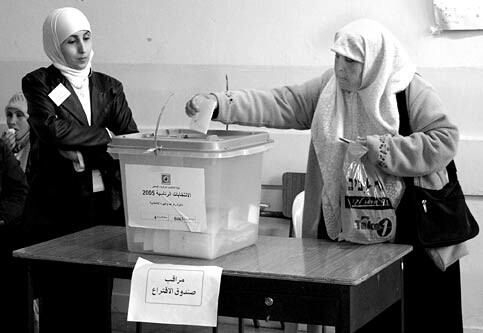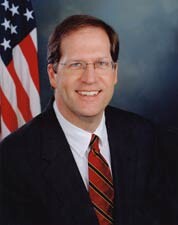The Electronic Intifada 9 January 2005

A Palestinian woman votes, while another observes, at a polling station in central Ramallah. (Photo: Rob Maguire)
Once again, the media and the international peace process industry have declared that it is an “historic day” for the Palestinian people. The occasion this time is the election of Mahmoud Abbas as head of the Palestinian Authority in the occupied territories. Yet most of these Palestinian people, for whom this day has been declared historic, do not live in the occupied territories; the majority of Palestinians live in diaspora or as refugees outside their homeland, a direct result of the ethnic cleansing which created Israel in 1947-48, and of the occupation of the remainder of Palestine in 1967.
For Palestinians in the diaspora, such historic days feel like everyone is having a party that is supposed to be in your honor, except that no one invited you, or perhaps it is like watching a television movie of your life that bears little resemblance to reality. The feeling I have now is exactly what I felt on that other big historic day, September 13, 1993, when the Oslo Accords were signed in Washington by a beaming Yasir Arafat and the recalcitrant Israeli prime minister Yitzhak Rabin, under the beatific gaze of President Bill Clinton. I feel a mixture of exasperation, hopelessness and determination.
For days now, I have done hours of talk radio about the elections, trying to explain as best as I can why replacing Yasser Arafat with Mahmoud Abbas will not lead to peace, why Palestinians aren’t ecstatic, how the Israeli occupation makes democracy impossible. But for the most part, the script has been written and Palestinians are only called upon to read their lines. So the TV and newspapers are full of happy Palestinian voters who debate only whether Abu Mazen (Mahmoud Abbas) or Mustafa Barghouti is right for them. Herds of international observers are on hand to certify that a few irregularities notwithstanding, this was a model election of which Palestinians can be proud.

John Sununu: Reading the US script
The reports I heard directly from associates on the ground only add to the disconnect between what Palestinians are experiencing and how the story is being told. EI’s Arjan El-Fassed, an accredited election monitor posted in Gaza reported shortly before polls were scheduled to close that in the Shaaf area of Gaza City, a little more than 1,000 of 20,000 registered voters had voted — a turnout of about seven percent. Chaos had broken out, he said, after Palestinian election officials had changed the rules at the last minute to allow voters to vote at any polling station in a desperate bid to raise the turnout and perhaps to open the possibility of a person casting multiple votes. The Palestinian Centre for Human Rights immediately announced it was appealing what it called an illegal decision.
EI’s Maureen Murphy, monitoring the elections in the Hebron area with the Al-Haq human rights organization reported that many people who turned out to vote did so despite feeling resigned to the fact that whoever wins will have no power to improve their lives or change the reality Israel has imposed on them.
In the ghost-written screenplay that the Palestinians are being forced to act out, the election is “good news.” This means that any information that interferes with this agreed narrative — that we are at the cusp of a new era of peace, democracy and reform — has to be carefully filtered out.
As I sift through the deluge of election news, I find I am still unable to stop thinking about the murder by the Israeli army of seven Palestinian children in Gaza, literally blown to pieces by a tank shell on 4 January. This was barely reported in the US media. National Public Radio, supposedly the paragon of in-depth and nuanced reporting, actually covered up the story, reporting only that Mahmoud Abbas had called Israel the “Zionist Enemy” without mentioning the killing of the children at all, even though Abbas had made his statement in direct response to the atrocity.
A few days earlier, I had emailed a New York Times reporter to ask why in a lengthy article about the election campaign, the news that the Israeli army had killed nine Palestinians in a single day, including two children and a man living with Down’s Syndrome, had been mentioned only in the final paragraph. I pointed out that whenever the victims are Israelis, his newspaper gives their deaths great prominence, and asked whether we should therefore understand that Palestinian lives are viewed as less valuable. The reporter wrote back: “Your point is very well taken … the problem is more with the nature of daily stories than with differential humanity, but I will bear your good letter in mind. No life is worth less than any other.” At first I felt satisfied by this answer, but the more I thought about it, the angrier I became.
Actually differential humanity is precisely the issue. The entire “peace process” and the discourse about Palestine today is structured around the absolutely inverted claim that Israelis are the principal victims of violence and Palestinians the principal perpetrators and aggressors.
So it would appear that in the mind of this reporter, and many others, the daily killing of Palestinians is not newsworthy because it is routine. Whereas in any period where the killing of Israelis was routine, it was that very fact which made the story newsworthy. It is the claim that the killing of Israelis is routine or threatens to become routine which is used to justify and provide context for all of Israel’s actions, from assassinations to the mass demolition of homes in Gaza’s Jabaliya and Rafah refugee camps to the construction of the apartheid wall inside the occupied West Bank.
In order to maintain this fiction, other crucial facts must be routinely screened from public view. While the peace process scriptwriters insist that Mahmoud Abbas can bring peace where Arafat failed, the Israelis at least know better.
The day before the election, Israel’s Ha’aretz newspaper published a lengthy report by Aluf Benn headlined “Quietly carrying on building,” about how Israel’s settler colonies are growing apace across the West Bank. Israel is drawing up construction plans in over 120 settlements across the occupied West Bank with the full approval and knowledge of incoming US Secretary of State Condoleeza Rice, Benn says. According to an Israeli government source quoted in the article, “If the U.S. recognizes your claim that the [settlement] blocs will remain yours forever, why should it make a fuss when you build on your own property?” Ha’aretz added that according to Peace Now, an Israeli group that meticulously documents settlement activity, “the main building effort in the Jewish settlements in the West Bank is now focused on the area between the Green Line [1967 border] and the separation fence [apartheid wall], and it is aimed at turning the fence into Israel’s permanent border.”
So in the long-running Palestine soap opera, Abbas, the understudy who has been hired to replace the deceased lead actor Arafat, is being offered the choice of two roles by the Israeli-American scriptwriters. He can play the obedient native administrator of a defeated people who gets to wear a suit and call himself president of a fictional state, or he can don Arafat’s kaffiyeh and assume the role of the Palestinians’ unreformed “terrorist” leader. If he chooses the former role, he may get the political equivalent of an Oscar — the Nobel Peace Prize.
But like in all soap operas, repetitiveness and increasingly absurd plot twists eventually wear out even the most faithful audience. And when this episode is over, the Palestinian people will still be there, steadfastly, patiently, determined to regain their usurped rights and see justice done, come what may.
Related Links
Ali Abunimah is a founder of The Electronic Intifada.




